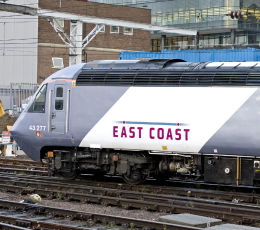Posted 20th January 2010 | 2 Comments
Ten-year franchises ‘will be the new minimum’–Adonis

Intercity East Coast was taken over by the DfT on 13 November, and is expected to be re-awarded within two years (picture: Brian Morrison)
THE TRANSPORTsecretary is proposing that future passenger rail franchises should run for at least ten years, with contracts of up to 22 years also on the cards. Operators will have more influence on infrastructure enhancements, but will also face stiffer penalties if they bail out before a contract term is complete.
The proposals are set out in a new paper, the 'Future of Franchising', which the Department for Transport said will play a part in the forthcoming consultations on replacement franchises for Intercity East Coast, Greater Anglia (currently National Express East Anglia) and Essex Thameside (currently c2c).
Transport secretary Andrew Adonis said: "Franchise length is about striking a balance between securing investment from bidders - which comes from longer franchises - and testing the market regularly to ensure best value for taxpayers - which comes from shorter contracts. Ten year franchises, with the possibility of longer contracts should bidders make sensible and affordable proposals, will allow operators to invest and suggest new innovations. However, having longer franchises means that we will need to introduce tougher performance measures and more potential contract break points to ensure bad operators can be removed."
The failure of National Express East Coast last year was a source of irritation and embarrassment to the Department, and Lord Adonis confirmed that the issue of failed franchises is still causing concern, when he added: "Recent events have also shown how vital it is that we make it harder for operators to walk away from their franchises, so performance bonds will rise and we will expect much larger guarantees from parent companies."
The need for larger performance bonds may pose a problem for some bidders, because they will need to find more money up front, but in return they will gain a longer contract with improved opportunities for investment.
The announcement has been welcomed by ATOC, which has been campaigning for longer franchises. The longest franchise running at the moment is Chiltern Railways, which was awarded for up to 20 years in 2001 and has now been confirmed for its full term along with the announcement of the Evergreen 3 project, which will provide a second through route between London and Oxford via a new chord at Bicester.
Reader Comments:
Views expressed in submitted comments are that of the author, and not necessarily shared by Railnews.

shaun, sunderland, united kingdom
Wont mean a thing unless network rail get their costs down. increased profits just mean increased acccess charges for what you have already mersey rail offering to do a job for half the cost of network rail is an example. this smack of a bloated organisation when a regional ITA can find savings a national company cant.
Joel Kosminsky, London, Britain
We'll still be subsidising franchise profits; take the recent bad weather, the headless-chicken return to 'normal', and the worse state that led to. Franchises are overpriced now: trains *must* run or operators plummet into serious loss. How much more will a ten year licence to rob the public cost, in every sense?